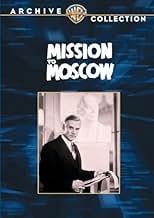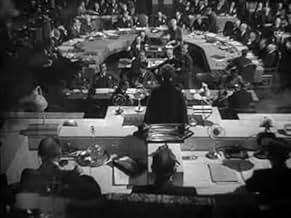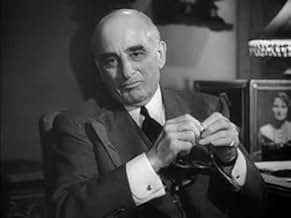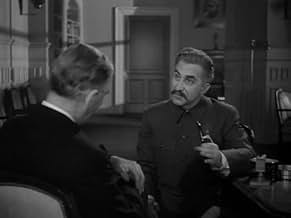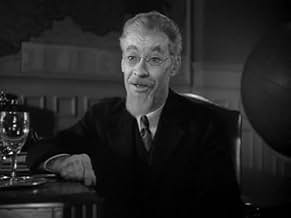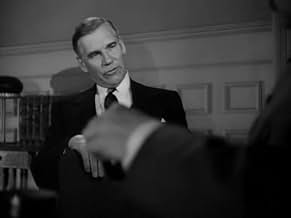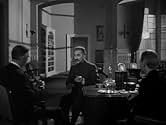VALUTAZIONE IMDb
5,4/10
1110
LA TUA VALUTAZIONE
Aggiungi una trama nella tua linguaAmbassador Joseph Davies is sent by FDR to Russia to learn about the Soviet system and returns to America as an advocate of Stalinism.Ambassador Joseph Davies is sent by FDR to Russia to learn about the Soviet system and returns to America as an advocate of Stalinism.Ambassador Joseph Davies is sent by FDR to Russia to learn about the Soviet system and returns to America as an advocate of Stalinism.
- Regia
- Sceneggiatura
- Star
- Candidato a 1 Oscar
- 2 vittorie e 1 candidatura in totale
Recensioni in evidenza
I can understand the need for pro-allied propaganda when the outcome of the war was still uncertain, but this was pathetic. It's no surprise that Howard Koch was the screenwriter for this rather sorry effort to promote Soviet propaganda, or that he was later cited by the HUAC. Propaganda can be fun - try North Star or Days of Glory. This movie is not an effort to raise morale or promote a cohesive war effort. It's purpose appears to try to justify any and all the barbaric atrocities committed during the Stalin regime. Example: The show trials were interspersed with remarks by allied journalists approving of the same judicial perversion for which we condemned Germany at Nueremburg. We agreed with the Soviet position that Trotsky was responsible for undermining the good works of the Soviet. We blame ourselves for the Russo-German alliance. The fact that Russia absorbed half of Poland in payment isn't discussed. This movie actually claims it was strategic move to buy time. Davies (Walter Huston) spends the entire movie trying to convince us that the Soviet Union performed a miracle, 5 yrs at a time. Big business is portrayed as greedy capitalists anxious to do business with Germany and Japan in pursuit of the Almighty buck. Russia invaded Finland as an act of self defense etc, etc. The examples are too numerous to mention.
Michael Curtiz' direction, as usual, is exciting and flawless. It is this movies' only saving grace. The early scene when Davies arrives at the Hamburg train station was precious. There are Swastikas everywhere. In typical Curtiz style, shadow troops marched passed the camera. Mein Kampf was for sale everywhere. Pathetic deportees are on the platform - number tags on their chest - waiting for transport to the camps. Hitler Youth marching like toy soldiers. If you can put the politics aside (I couldn't) you can really enjoy the visuals.
But beware, there was a message to this madness.
Michael Curtiz' direction, as usual, is exciting and flawless. It is this movies' only saving grace. The early scene when Davies arrives at the Hamburg train station was precious. There are Swastikas everywhere. In typical Curtiz style, shadow troops marched passed the camera. Mein Kampf was for sale everywhere. Pathetic deportees are on the platform - number tags on their chest - waiting for transport to the camps. Hitler Youth marching like toy soldiers. If you can put the politics aside (I couldn't) you can really enjoy the visuals.
But beware, there was a message to this madness.
This film was made to patronize Joeseph Stalin and warm USA audiences to American-Soviet relations. Warner boss Jack Warner called it the worst mistake of his career. Warner was a supporter of FDR and Roosevelt asked him to have this film made based on the 1941 book by former Ambassador to the USSR (1936-1938) Joseph E. Davies. Several films were made during this time to achieve the same effect like song of Russia, North Star and Counter Attack but this was a film for Stalin to see himself, hand delivered on a yet another mission to Moscow by Davies. This film portrays the brutal dictator Stalin as a fair and just man who has turned his backward country into a progressive industrial and agricultural giant that is moving toward democracy and desires peace and protection of it's borders. It mentions nothing of the one million deaths in the Soviet gulags that happened during Davies' ambassadorial tenure on his mission to Moscow. It glosses over the infamous purge show trials where Stalin rid himself of prominent party leaders where he had 50 of the 54 of the three trials executed under the guise of traitors who were conspiring with Germany and Japan to weaken the USSR. Stalin wanted absolute power but this film portrays these as fair and just trials. The costly Russo-Finnish War of 1939 is described by Davies as simply the Soviets wanting to annex Finland to protect Finland from the Nazi's. 23,000 Finns were killed and 43,000 wounded in this so-called effort to protect them. 127,000 Soviets were killed and 265,000 wounded. There is no mention of Stalin's man-made famine of the 1930's that resulted in the genocide of millions of Ukrainians. Stalin is portrayed as everybody's favorite uncle and FDR wanted Stalin to see how sympathetic we were to to him by having him actually view this film to maneuver a FDR-Stalin meeting in Alaska. FDR sent former Ambassador Davies on another mission to Moscow with this film and a message to Stalin from Roosevelt as to how much he respected him. Davies' successor in Moscow Ambassador William H. Standley was not in the loop on this mission and furious and resigned. Davies screened this film for Stalin. Stalin wasn't that impressed with the film or FDR's intentions and stalled on the Alaska summit. FDR was forced to send Secretary of State Cordell Hull to Moscow and Stalin agreed to a summit in Teheran instead of Alaska which would also include Winston Churchill who FDR didn't want for his proposed Alaska summit.
Michael Curtiz is the director and the film looks good from an artistic standpoint. Curtiz was best known for Casablanca and after starting out as an important European director in the teens and twenties he moved to Hollywood and became an important filmmaker. Howard Koch who wrote screenplays for such films as Casablanca adapted the Davies' book for the screen which later got him blacklisted from Hollywood. Bert Glendon who did such films as Hotel Imperial and The Ten Commandments in the 20's, Kidnapped and Young Mr. Linclon in the 30's and One Night in Lisbon and Our Town in the 40's is the film's cinematographer. This film was nominated for an Academy Award for Best Art Direction and stars FDR's favorite actor Walter Huston as Ambassador Davies. Also in the talented cast are Ann Harding, George Tobias, Oscar Homolka, Eleanor Parker, Gene Lockhart, Frank Faylen and Cyd Charisse. You can enjoy the documentary style approach to this film and the skills of it's renowned filmmakers and big studio production but you can't get past a propaganda film that glorifies the Stalin dictatorship. I would give it a 4.5 out of 10.
Michael Curtiz is the director and the film looks good from an artistic standpoint. Curtiz was best known for Casablanca and after starting out as an important European director in the teens and twenties he moved to Hollywood and became an important filmmaker. Howard Koch who wrote screenplays for such films as Casablanca adapted the Davies' book for the screen which later got him blacklisted from Hollywood. Bert Glendon who did such films as Hotel Imperial and The Ten Commandments in the 20's, Kidnapped and Young Mr. Linclon in the 30's and One Night in Lisbon and Our Town in the 40's is the film's cinematographer. This film was nominated for an Academy Award for Best Art Direction and stars FDR's favorite actor Walter Huston as Ambassador Davies. Also in the talented cast are Ann Harding, George Tobias, Oscar Homolka, Eleanor Parker, Gene Lockhart, Frank Faylen and Cyd Charisse. You can enjoy the documentary style approach to this film and the skills of it's renowned filmmakers and big studio production but you can't get past a propaganda film that glorifies the Stalin dictatorship. I would give it a 4.5 out of 10.
Among the comments here I don't see much recognition of the fact that this propaganda film was released at the height of World War II, when the battle against Nazis was focused on Stalingrad, which arguably was the crucial battle of the war in Europe.
The context of this film cannot be ignored or minimized. Propaganda films are morale films, and the omissions and distortions which have been cited in Mission to Moscow are beside the point. Of course Stalin was a monster before, during and after World War II. Of course Joseph E. Davies was a naif, and a pompous one at that. Perhaps that's why he only lasted a year as ambassador.
On one hand, there is an absolutely ludicrous review here, praising Mission to Moscow as dispelling the terrible calumnies against the great Soviet achievements. On the other hand, there are those on the opposite side who, though far more accurate about Stalin and about how this film whitewashes his atrocities, seem so rabid in their responses, they fail to understand, or conveniently ignore, that propaganda films as documentaries are more or less bull, and that it's stupid to criticize a propaganda film because it's a propaganda film.
What is interesting about Mission to Moscow is not what it is trying to say or do, which requires little insight to divine, but how well it does it. This is a Hollywood "A" film enlisted in the service of propaganda. Top cast, direction and production values should have made for a very strong message to 1943 American audiences, whom the government wanted to think of the war against Germany as "We're all in this together."
As to the outrage of Stalin's show trials, I think that the sinister, menacing demeanor of one of the great Hollywood heavies Victor Francen as prosecutor Vyshinsky, versus the rather meek, contemplative demeanor of the defendants, suggests that the film knows what's going on, even if Davies doesn't.
Yes, the relentless pro-Soviet propaganda is a bit hard to take for those who sit smugly in the light of hindsight. But if you look at Mission to Moscow as document rather than documentary, you will gain an insight into the kind of public mindset called for by our government at a crucial moment in our history.
The context of this film cannot be ignored or minimized. Propaganda films are morale films, and the omissions and distortions which have been cited in Mission to Moscow are beside the point. Of course Stalin was a monster before, during and after World War II. Of course Joseph E. Davies was a naif, and a pompous one at that. Perhaps that's why he only lasted a year as ambassador.
On one hand, there is an absolutely ludicrous review here, praising Mission to Moscow as dispelling the terrible calumnies against the great Soviet achievements. On the other hand, there are those on the opposite side who, though far more accurate about Stalin and about how this film whitewashes his atrocities, seem so rabid in their responses, they fail to understand, or conveniently ignore, that propaganda films as documentaries are more or less bull, and that it's stupid to criticize a propaganda film because it's a propaganda film.
What is interesting about Mission to Moscow is not what it is trying to say or do, which requires little insight to divine, but how well it does it. This is a Hollywood "A" film enlisted in the service of propaganda. Top cast, direction and production values should have made for a very strong message to 1943 American audiences, whom the government wanted to think of the war against Germany as "We're all in this together."
As to the outrage of Stalin's show trials, I think that the sinister, menacing demeanor of one of the great Hollywood heavies Victor Francen as prosecutor Vyshinsky, versus the rather meek, contemplative demeanor of the defendants, suggests that the film knows what's going on, even if Davies doesn't.
Yes, the relentless pro-Soviet propaganda is a bit hard to take for those who sit smugly in the light of hindsight. But if you look at Mission to Moscow as document rather than documentary, you will gain an insight into the kind of public mindset called for by our government at a crucial moment in our history.
Businessman Joseph Davies is sent to Stalin's Russia by FDR shortly before war breaks out. His assignment: assess the Soviet's war-making capabilities, the extent of their war-readiness and Stalin's reliability as a potential ally against Hitler. What he sees contradicts a good deal of the anti-Soviet reporting in the (Henry Luce) national press and elsewhere. The Soviets have organized a society of largely peasants and serfs into a first-class industrial power. The Stalin regime enjoys widespread popular support, and the Kremlin seems to be preparing for war with the Nazis. On the other hand, as Stalin warns half-way through the film, anti-Soviet feeling in the British and French governments may necessitate a temporary Soviet "truce" with Hitler to gain more time to prepare for war.
The film (by the director of "Casablanca" is frequently plodding and arcane. However, for war-time audiences, it offered an sure-footed defense of the Russian war effort at a time when the full capabilities of the Soviet Red Army were being dramatically made known (the film was released shortly after the seminal German surrender at Stalingrad, the most frightful battle of modern warfare). Too, much of the film suggests what recent historians have confirmed; Stalin's regime, while widely loathed in the West, precipitated an astonishing degree of devotion and loyalty at home, a point driven home by the outcome of a thousand battles from the Volga to Berlin.
It seems that just about every bit player in Hollywood appeared at least once in this movie. Watch especially for Glenn Strange in a three second appearance as a southern newspaper reporter. The fillm was a major part of the war effort half-way through that conflict, and appears to have succeeded admirably in its original purpose. Walter Huston, as Davies, is absolutely first rate as the droll, understated American capitalist who nevertheless comes to appreciate the war effort of a much maligned people and social system.
The film (by the director of "Casablanca" is frequently plodding and arcane. However, for war-time audiences, it offered an sure-footed defense of the Russian war effort at a time when the full capabilities of the Soviet Red Army were being dramatically made known (the film was released shortly after the seminal German surrender at Stalingrad, the most frightful battle of modern warfare). Too, much of the film suggests what recent historians have confirmed; Stalin's regime, while widely loathed in the West, precipitated an astonishing degree of devotion and loyalty at home, a point driven home by the outcome of a thousand battles from the Volga to Berlin.
It seems that just about every bit player in Hollywood appeared at least once in this movie. Watch especially for Glenn Strange in a three second appearance as a southern newspaper reporter. The fillm was a major part of the war effort half-way through that conflict, and appears to have succeeded admirably in its original purpose. Walter Huston, as Davies, is absolutely first rate as the droll, understated American capitalist who nevertheless comes to appreciate the war effort of a much maligned people and social system.
One of the most controversial films ever made, Mission To Moscow was not good for anyone's career who got involved with the making. Like Song Of Russia made over at MGM, Mission To Moscow was a film made specifically to improve Soviet-American relations in facing the common enemy they had.
The Soviet Union no matter how much the American Communist Party trumpeted their virtues, still had a real image problem in a lot of quarters due to the purges that Joseph Stalin conducted, due to the tremendous dislocation his five year plans created, due to the misery caused by the collectivization of agriculture and the systematic slaughter of Kulaks. Kulaks roughly translated could be anyone who owned a large estate to someone who might own a slightly bigger piece of land and maybe some farm animals. Stalin slaughtered thousands of them to force collectivization.
Our first ambassador to the Soviet Union was William C. Bullitt who was sent there in 1933. The Republican post World War I presidents did not diplomatically recognize the Soviet Union, Franklin Roosevelt's first foreign policy initiative was to extend recognition. Bullitt was a guy at first enthused, but then got very disillusioned by what he saw. He and FDR had a falling out and he left Moscow in 1936.
Joseph E. Davies was an industrialist and large Democratic contributor who did go back with FDR to the Wilson administration. He was appointed US Ambassador and after that became a cheerleader for the Soviets. As is shown in the film, Davies just blindly accepted every piece of propaganda handed to him. Films made in 1943 were not going to cast a critical light on the dark underside of Communist Russia.
Walter Huston dusts off his Sam Dodsworth persona to play Ambassador Davies. Ann Harding plays his dutiful wife and Eleanor Parker their daughter. Vladimir Sokoloff is President Kalinin, Gene Lockhart plays Prime Minister Molotov and Oscar Homolka plays Foreign Minister Litvinov all well known personalities of the day. In the Soviet Union like other countries Davies would have been required to present his credentials to the president and Russia did have a figurehead president who was a great deal less than Mission To Moscow makes him out.
At that time Joseph Stalin was only the Secretary of the Presidium of the Communist Party, but as such wielded the real power. The People's Republic of China adopted a similar set up that never changed with Mao Tse-tung as Party head and holding the real power while Mao lived.
Stalin is played by actor Manart Kippen and is only seen once as Davies is prepared to leave the Russian embassy. He's so shy and retiring the portrayal is so absolutely ludicrous that it leaves me laughing. But Davies sitting through the purge trials and accepting without question all the testimonies and forced confessions is also ludicrous.
After his time was up as Ambassador, Davies wrote the book on which this film was based and did go on a speaking tour promoting Russo-American cooperation. He was doing this on behalf of his friend and president FDR, but Davies had also become a real true believer in the 'miracle' that was Soviet Russia.
When the Cold War started three films became the targets of the House Un American Activities Committee, they were ripe targets that the conservative members were grateful for. The three films were The North Star from 20th Century Fox, Song Of Russia from MGM, and Mission To Moscow. None got more criticism than this one. Screenwriter Howard Koch who had won an Oscar this same year for Casablanca, earned a place on the blacklist because of Mission To Moscow. Whatever Koch's personal political convictions were, in this case all he did was translate to the screen what was in Davies's book.
Davies was held up to ridicule and in some measure deserved a bit of it because of Mission To Moscow. Time and the end of the Cold War have given us a proper perspective of the Russian contribution towards defeating the Nazis. In fact it was the lion's share in Europe. Policy decisions were made on the basis of keeping the Russians in the war before the Americans and British and respective allies got on the European continent with forces to make it a two front war, first in Italy and then in France. There was a justifiable fear that Stalin would make a separate peace with Hitler just as he signed the non-aggression pact with him before World War II started in 1939.
Of course the reports that Davies wrote off about the brutality of the Soviet Union were also true. The reactionaries had a field day with him, he was never taken seriously again. For that reason Mission To Moscow has not worn well either as history or entertainment.
The Soviet Union no matter how much the American Communist Party trumpeted their virtues, still had a real image problem in a lot of quarters due to the purges that Joseph Stalin conducted, due to the tremendous dislocation his five year plans created, due to the misery caused by the collectivization of agriculture and the systematic slaughter of Kulaks. Kulaks roughly translated could be anyone who owned a large estate to someone who might own a slightly bigger piece of land and maybe some farm animals. Stalin slaughtered thousands of them to force collectivization.
Our first ambassador to the Soviet Union was William C. Bullitt who was sent there in 1933. The Republican post World War I presidents did not diplomatically recognize the Soviet Union, Franklin Roosevelt's first foreign policy initiative was to extend recognition. Bullitt was a guy at first enthused, but then got very disillusioned by what he saw. He and FDR had a falling out and he left Moscow in 1936.
Joseph E. Davies was an industrialist and large Democratic contributor who did go back with FDR to the Wilson administration. He was appointed US Ambassador and after that became a cheerleader for the Soviets. As is shown in the film, Davies just blindly accepted every piece of propaganda handed to him. Films made in 1943 were not going to cast a critical light on the dark underside of Communist Russia.
Walter Huston dusts off his Sam Dodsworth persona to play Ambassador Davies. Ann Harding plays his dutiful wife and Eleanor Parker their daughter. Vladimir Sokoloff is President Kalinin, Gene Lockhart plays Prime Minister Molotov and Oscar Homolka plays Foreign Minister Litvinov all well known personalities of the day. In the Soviet Union like other countries Davies would have been required to present his credentials to the president and Russia did have a figurehead president who was a great deal less than Mission To Moscow makes him out.
At that time Joseph Stalin was only the Secretary of the Presidium of the Communist Party, but as such wielded the real power. The People's Republic of China adopted a similar set up that never changed with Mao Tse-tung as Party head and holding the real power while Mao lived.
Stalin is played by actor Manart Kippen and is only seen once as Davies is prepared to leave the Russian embassy. He's so shy and retiring the portrayal is so absolutely ludicrous that it leaves me laughing. But Davies sitting through the purge trials and accepting without question all the testimonies and forced confessions is also ludicrous.
After his time was up as Ambassador, Davies wrote the book on which this film was based and did go on a speaking tour promoting Russo-American cooperation. He was doing this on behalf of his friend and president FDR, but Davies had also become a real true believer in the 'miracle' that was Soviet Russia.
When the Cold War started three films became the targets of the House Un American Activities Committee, they were ripe targets that the conservative members were grateful for. The three films were The North Star from 20th Century Fox, Song Of Russia from MGM, and Mission To Moscow. None got more criticism than this one. Screenwriter Howard Koch who had won an Oscar this same year for Casablanca, earned a place on the blacklist because of Mission To Moscow. Whatever Koch's personal political convictions were, in this case all he did was translate to the screen what was in Davies's book.
Davies was held up to ridicule and in some measure deserved a bit of it because of Mission To Moscow. Time and the end of the Cold War have given us a proper perspective of the Russian contribution towards defeating the Nazis. In fact it was the lion's share in Europe. Policy decisions were made on the basis of keeping the Russians in the war before the Americans and British and respective allies got on the European continent with forces to make it a two front war, first in Italy and then in France. There was a justifiable fear that Stalin would make a separate peace with Hitler just as he signed the non-aggression pact with him before World War II started in 1939.
Of course the reports that Davies wrote off about the brutality of the Soviet Union were also true. The reactionaries had a field day with him, he was never taken seriously again. For that reason Mission To Moscow has not worn well either as history or entertainment.
Lo sapevi?
- QuizThis film was often mentioned during the 1947 House Un-American Activities Committee (HUAC) in its investigation of alleged Communist infiltration of the motion picture industry and was chiefly responsible for the blacklisting of screenwriter Howard Koch. Warner Bros. studio head Jack L. Warner defended the picture as being "made when our country was fighting for its existence, with Russia as one of our allies . . . The picture was made only to help a desperate war effort and not for posterity."
- BlooperAside from the issue of the fairness of the Moscow purge trials, or the truthfulness of the alleged confessions of the accused, the people shown standing trial together in the film in fact did not all stand trial at the same time. There were two such major show trials, one in 1937, the second in 1938, and the real life characters depicted in the film as being tried simultaneously were actually tried in separate groups at one of the two trials.
- Citazioni
Ambassador Joseph E. Davies: Mr. Stalin, I believe history will record you as a great builder for the benefit of mankind.
- Curiosità sui creditiOpens with a card reading: We have the honor to present the former Ambassador from the United States to the Soviet Union, the Honorable Joseph E. Davies, who will address you prior to the showing of the film made from his important book, "Mission to Moscow". In the picture itself, Mr. Walter Huston portrays Mr. Davies during those vital years encompassed in his now significant report to this nation. And now, Mr. Davies: [Mr. Davies gives a presentation on the actual events leading up to these events, and to this film.]
- ConnessioniFeatured in Hollywood on Trial (1976)
- Colonne sonoreAmerica
(uncredited)
aka "My Country 'tis of Thee"
Music from "God Save the King"
Traditional
[In the score when Woodrow Wilson's bust is shown]
I più visti
Accedi per valutare e creare un elenco di titoli salvati per ottenere consigli personalizzati
- How long is Mission to Moscow?Powered by Alexa
Dettagli
- Data di uscita
- Paese di origine
- Lingue
- Celebre anche come
- På uppdrag i Moskva
- Luoghi delle riprese
- Lake Arrowhead, San Bernardino National Forest, California, Stati Uniti(Lake that Joe and family set off in a dingy named after his wife Marjorie)
- Azienda produttrice
- Vedi altri crediti dell’azienda su IMDbPro
Botteghino
- Budget
- 1.516.000 USD (previsto)
- Tempo di esecuzione2 ore 4 minuti
- Colore
- Proporzioni
- 1.37 : 1
Contribuisci a questa pagina
Suggerisci una modifica o aggiungi i contenuti mancanti

